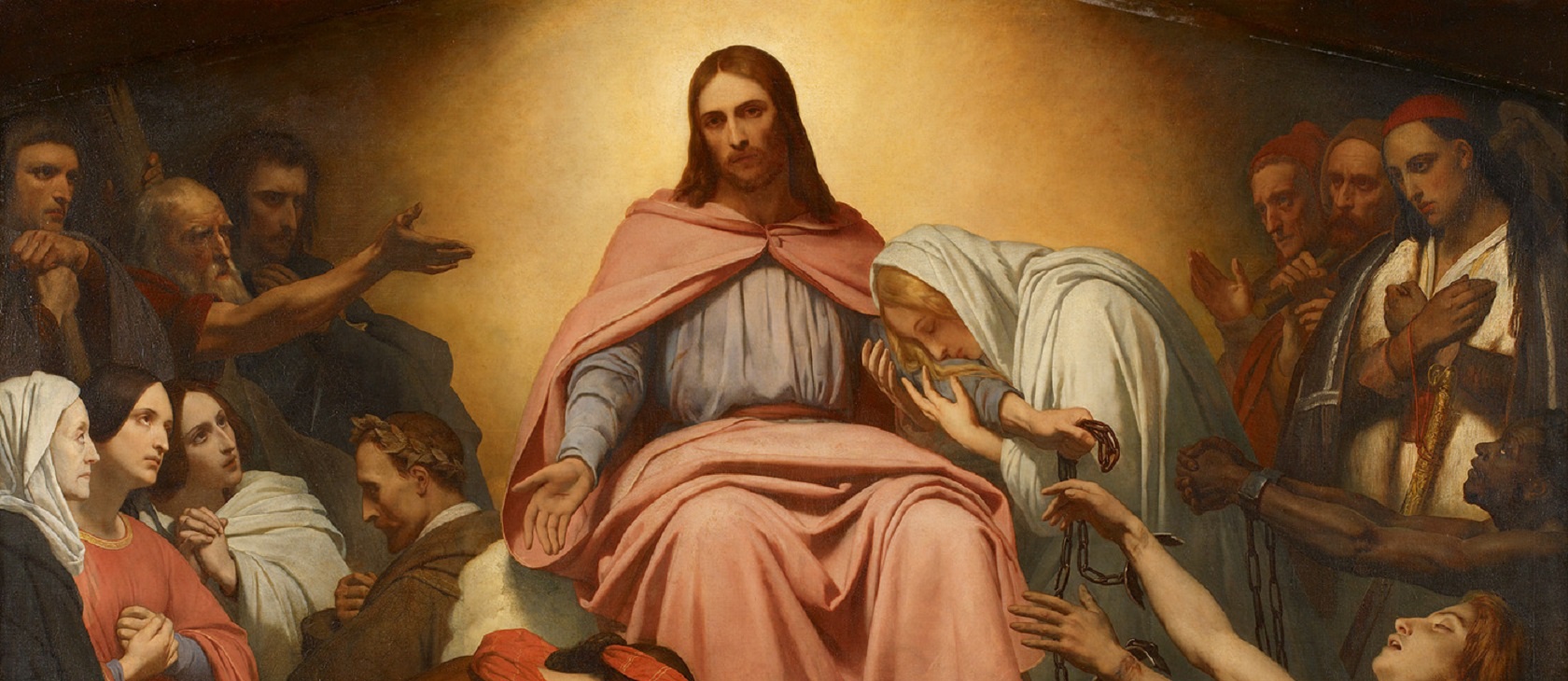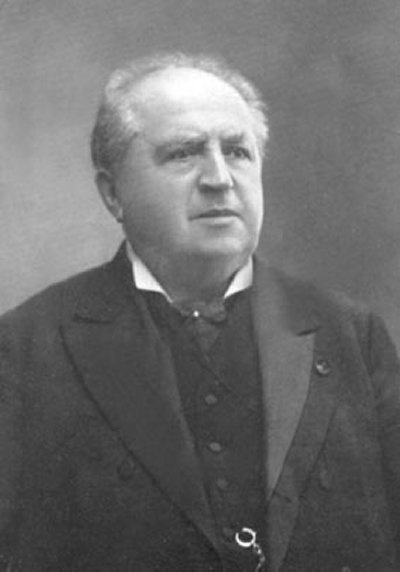Jesus not only sought to bring a spiritual salvation, but also countered human misery and did so up until the very end. He fed the thousands and healed the sick; the blind could see, the mute could speak, and the dead were raised. This was in no way just a peripheral matter for him, as is proved in that, when John the Baptist investigated his messiahship, Jesus did not tell his messengers to report that “I preach the gospel, and heal many sick as well,” but that, first, “the blind receive their sight and the lame walk, lepers are cleansed and the deaf hear, and the dead are raised up,” and then, in the second place, that “the poor have good news preached to them” [Matt 11:5].
Our King is Christus Consolator – Christ the Comforter -- in the spiritual as well as the physical sphere. Sin did not come alone, but was necessarily accompanied by human misery. This is why Christ, in order to break the work of Satan, had to address the situation resulting from sin on two sides at once. It was necessary for him to stem the tides not only of sin, but also of misery. We may of course not conclude from this sequence that the gospel was initially a matter of secondary importance for Jesus. There is no doubt that the spiritual is and remains the starting point, but by placing his opposition to our human misery in the foreground, Jesus does demonstrate that we would be doing his honor a disfavor if we were only to honor him as the one who announces the gospel, and that we only give him the honor he deserves once we venerate him for saving us from both sin and physical misery. The one may not be disparaged in favor of the other. The two go together. It is only by paying attention to both of them that you will understand the Christus Consolator in all his fullness. And what his work in saving people from their physical misery always has going for it is this: that the Lord’s great majesty is displayed much more powerfully in these works that the Father has given him to do than it does in the preaching of the gospel. Also John the Baptist preached the gospel, but he did not perform any saving miracles. Whenever Jesus appealed to his Father’s testimony, he consistently pointed to the works—the miracles—he performed. And almost all these works were philanthropic in character in the sense in which we commonly use the term philanthropy today.
Churches, which have focused almost exclusively on spiritual matters, are beginning to realize that their honor is being damaged...
These works of miraculous healing have not continued in the same way as in the time of Christ and the apostles. But this does not mean that the church’s activities have therefore been cut in half, and that it ought to withdraw to the domain of the spiritual alone. Its lofty calling continues to be the fight against both sin and misery. The church must continue to display the image of Christ. As Jesus himself always acted in his twofold capacity as the Savior from sin as well as the Savior from misery, the nature of the case demands from his church that it demonstrate this twofold character as well. If the normal suppression of human misery consists in the hungry receiving bread and the sick being healed by their doctor, it follows that, as soon as the church entered upon the normal course of its existence, it had to preach the gospel first of all, then had to see to the needs of the poor, and thirdly had to offer aid to those who were sick.
We already see in the New Testament how the apostles not only appointed overseers to whom they gave the task to preach the gospel and exercise spiritual discipline over the church’s members, but also established the diaconate to demonstrate that the offices of the church must see to the spiritual as well as the physical needs of the congregation. Especially in churches where the apostles themselves could no longer be active but had entrusted the care of the congregation to others did this diaconate assume a more fixed form.
We are no more than stewards
Churches, which have focused almost exclusively on spiritual matters, are beginning to realize that their honor is being damaged, and, via their honor, the honor of their King, and, over against this usurpation of the government, are preparing to retain the domain that Christ has appointed to it. However, also in this protest the proper distinctions are often lacking. For one cannot and may not say that the care for the poor and sick in the entire population is the duty of the church. To insist on this would be to impose an altogether impossible task upon it; the chimera of the national church alone feeds this erroneous understanding. Indeed, if the entire nation were to belong to Christ’s church, the church would assume the care of the sick and poor for the entire nation and bear it all on its own. Yet it is impossible to do the following two things at one and the same time: on the one hand, to declare the notion of a national church to be an untenable and false chimera, while declaring, on the other hand, that the churches must look after the entire nation.
The kingly honor of Christ in his capacity as King in his church demands only that all those who belong to his church as subjects be sufficiently helped by the church in their needs. As our King, Christ has bought only his subjects for his possession. Therefore, all that a church member possesses belongs to Jesus; those who deny this are not Jesus’ possession. We are no more than stewards of our King over what we have and receive. And what honors our King is this: that all those in his church who experience need or suffering be supported by the other, well-to-do members. A member of the church should never have to seek help outside the church. The church’s members form a single holy family, and it would dishonor the church and its King if one of Jesus’ subjects were forced to seek aid from a person or power outside the church.
No church can therefore simply distribute; it must supply where there is need, and do so in such a way that the need itself disappears.
The sharing of possessions that began in Jerusalem after the day of Pentecost was unrestrained in its exaggeration, and yet it did express the awareness that all the members of one church together receive from their King the income from which all must live. No church can therefore simply distribute; it must supply where there is need, and do so in such a way that the need itself disappears. And, just like the church may never refer its poor to the civil government, so no church member may ever seek the aid of the state. It is the very honor of Christ as our King that forbids this.
If funds are left over and more can be done, then it is altogether recommended for munificence to be extended beyond the borders of the church and to be used to help others as well—yet this may not happen until the needs of all fellow members in the church have been met. There must be food, clothing, lodging, and heating for all, even in times of unemployment and illness.
For that reason, the church must also take the lot of its sick members to heart. And this work is not exhausted by the distribution of funds. The poor demand a very special kind of care, and the needs of the families that suffer due to the illness of their breadwinner must be met. For this reason it is good to see that this need is currently beginning to be looked after through community nursing, although for now this is just a start and only that. The honor of our King demands that more happen.
Everyone should know that, if he submits to Christ as King, then Christ demands that every need be supplied. From this it follows that the diaconate faces the serious question as to how that care must be arranged so as to ensure that the poverty is not fueled and that the congregation will eventually be delivered from the emergency situation. Even discipline must be applied where need arose or continues through a person’s own fault. Diaconal care must have a socially and morally elevating character.
This commentary is adapted from a chapter in Abraham Kuyper, Pro Rege: Living under Christ’s Kingship: The Kingship of Christ in Its Operation, vol. 2 (Bellingham, WA: Lexham Press, 2017), part of the twelve volume Abraham Kuyper Collected Works in Public Theology series sponsored by the Acton Institute.




